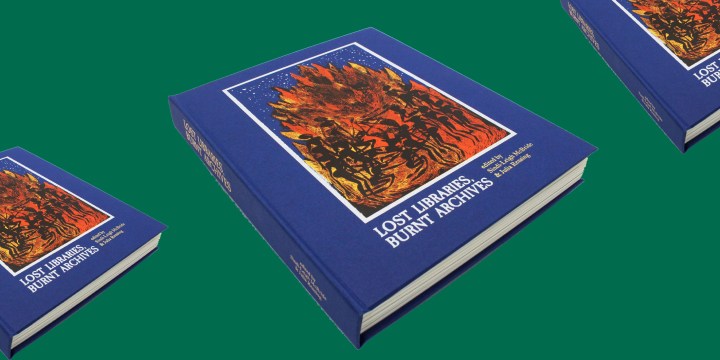JAGGER LIBRARY BLAZE
Things we found in the fire – New knowledge rises from the ashes of UCT’s burned Jagger Library

When UCT’s Jagger Library went up in flames after being caught in a wildfire, South Africa lost a priceless collection. A new book explores the calamity.
Libraries are special spaces, drawing all those aware of the magic of reading. When the University of Cape Town’s Jagger Library was immolated by a runaway fire in 2021, Sindi-Leigh McBride and Julia Rensing took proactive steps. Instead of only lamenting this priceless loss, they curated a book celebrating the immortal spirit of academic endeavour. Lost Libraries, Burnt Archives involves 22 artists, writers and academics. Mick Raubenheimer speaks to the co-editors.
What led to the creation of your book?
As African studies scholars attuned to the gravitas of the University of Cape Town’s Special Collections, we were horrified by the loss of the Jagger Library to wildfire on 18 April 2021. We watched the blaze online from Basel, Switzerland, aggrieved for the implications of this loss, not only for the university and its community but for African Studies in general. As professor of international economic relations, Adebayo Olukoshi succinctly puts it: “African studies outside Africa has generally enjoyed better resource endowments than African studies in Africa itself.”
For an African institution to no longer hold the wealth of knowledge resources that UCT Libraries Special Collections represented is both epistemically and politically devastating. Following this, we wanted to have a broad, interdisciplinary conversation to collectively contemplate the loss of the library and its implications for African studies. Our idea then was to bring a group of people together to produce something collectively and a new book, in response to the loss of many books, felt appropriate.
How did you come to collaborate on this project?
We are both PhD candidates at the Centre for African Studies at the University of Basel, with a shared interest in art. We discovered that Duane Jethro and Jade Nair would be curating a commemorative exhibition one year after the fire, and were interested in learning more about their work through an inclusive approach. Of Smoke and Ash: The Jagger Library Memorial Exhibition aimed to simultaneously memorialise the loss of the UCT Jagger Library building and its archive and celebrate UCT librarians and volunteers who participated in the salvage operations that followed. In their curatorial statement, Jethro and Nair explain: “We pay homage to the grief by creating a curatorial space evocative of the smoky, chaotic textures of the disaster. The exhibition is itself a salvage project.”
At the Michaelis Galleries, on UCT’s Hiddingh Campus, a faintly singed smell permeated the materials gathered by the curators. Charred books and other found objects from the Jagger Library site were presented together with images and texts contributed by volunteers, artworks created by graduate students from the Michaelis School of Fine Art, and UCT’s own documentary record of the salvage process. The exhibition offered an important opportunity to engage with the fire and related questions around archival loss.
Read more in Daily Maverick: Mother City fire: UCT’s intellectual heart ripped out after Jagger Library burns
Lost Libraries, Burnt Archives takes its cue from how Jethro and Nair used exhibition-making as a medium to make sense of the tragedy, not only to mourn what is lost and celebrate the salvage efforts, but also to expand how the event was understood. In our own work, we have been similarly interested in thinking about avenues to broaden approaches to knowledge production in African studies. Like Jethro and Nair, we are committed to pursuing, in professor of literary and cultural studies Pumla Dineo Gqola’s words, “new ways in which meaning might be further harnessed by placing the creative and the explicitly critical alongside one another”. In that spirit, we reached out to the curators, designed a workshop for collective engagement with the exhibition, and invited a group of artists and academics interested in archives, art history and other related topics. The workshop took place in April 2022, exactly a year after the tragedy. The contributions were submitted between June and November 2022 and, after a short and intense period of editing and design, the book was published in February 2023.
What was the process of selecting contributors?
We began by identifying people whose work was inspiring to us both in terms of academic knowledge production and creative approaches and invited them to participate in the project. This small initial group soon grew as contributors referred us to others interested in the topics we were engaging. In the end, the contributors include those who participated in the workshop, as well as individuals who were not able to attend but brought insights into archival research, fire, libraries, knowledge production and commemorative practices.
What is the ultimate aim of the book?
For us, this creative publication is an attempt to expand knowledge-production practices in African studies, questioning not only who is included in libraries and archives but also how the “knowledge” of these realities and related epistemic injustices emerge. Akin to how the curators salvaged and commemorated, the contributions gathered here similarly parse through the old and assemble myriad new ways of knowing. In a way, this book, emerging from the ashes of many other books, is a response to a lost archive and a contribution to a new one in the making. DM
Lost Libraries, Burnt Archives can be downloaded for free here.
A list of institutions where the book is available can be accessed here.
This story first appeared in our weekly Daily Maverick 168 newspaper, which is available countrywide for R29.






Comments - Please login in order to comment.